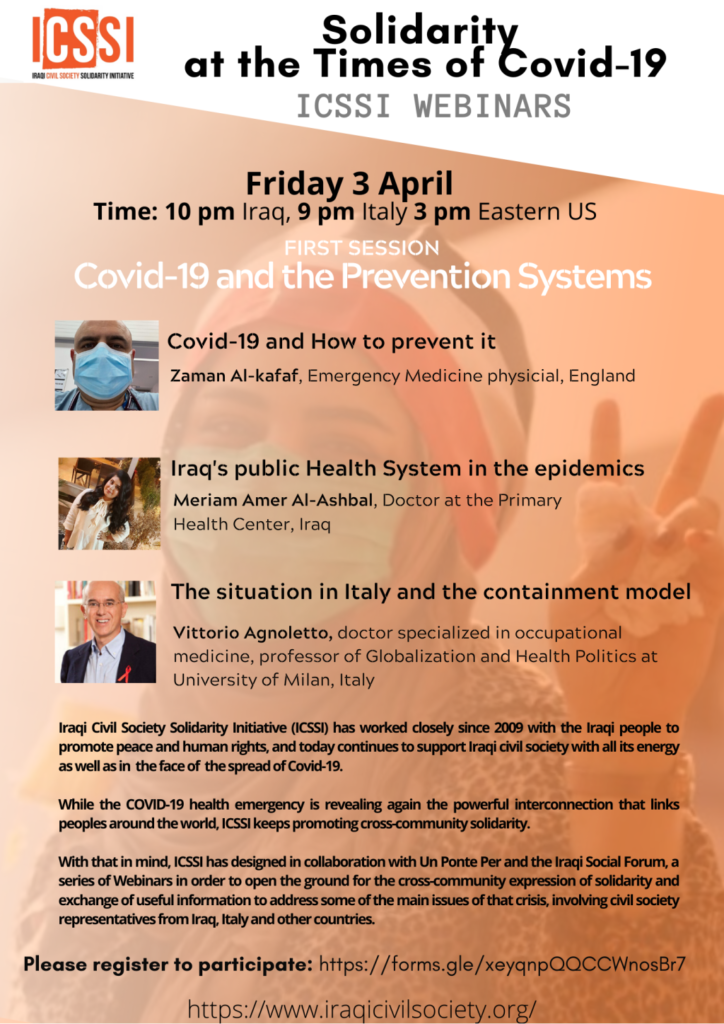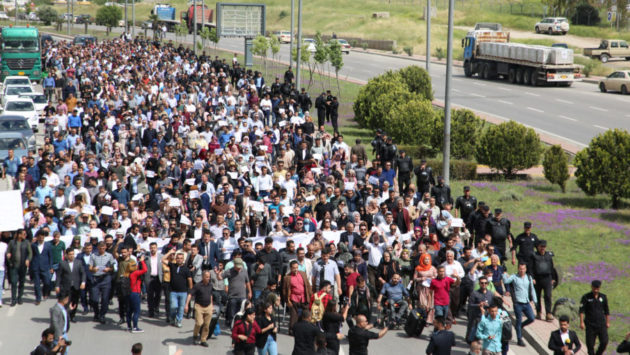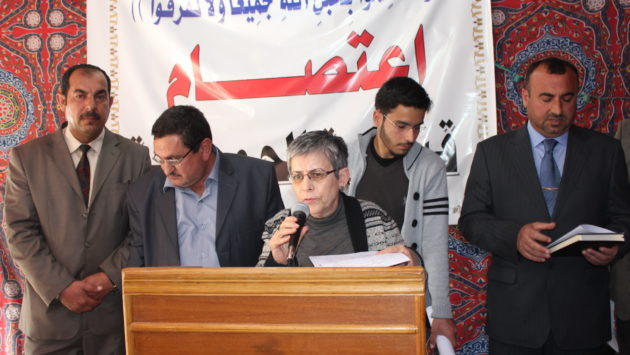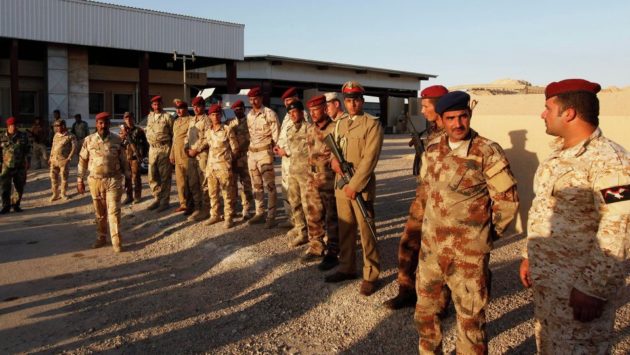Containment and Prevention of COVID-19: Building Global Solidarity
In response to the extraordinary circumstances humanity is confronting, the Iraqi Civil Society Solidarity Initiative (ICSSI), in collaboration with the Iraqi Social Forum, hosted a series of webinars on “Building Solidarity in the Time of the Coronavirus”. In our first webinar, three medical experts shared valuable and timely information to help participants stay safe and healthy in the face of the pandemic. Participants heard from the doctors about how COVID-19 infections are unfolding in the U.K., Iraq, and Italy; the difficulties their healthcare systems are encountering; and the achievements and shortcomings of government action to address the crisis. There were many lessons to be learned from the different situations in the three countries. Clearly we can all benefit from sharing our experiences. Since the Coronavirus is a threat to one and all, everywhere, learning from each other’s successes and failures can make us all safer. In a global crisis, only true global solidarity will empower us to meet the challenges we face. This is a vital lesson concerning the current pandemic, but it offers hope for humanity’s addressing other challenges in our world.

Our medical experts were:
- Dr. Zaman Al-Kafaf, an emergency medical physician in England;
- Dr. Meriam Amer Al-Ashbal, a doctor in a primary health center in Iraq;
- Dr. Vittorio Agnoletto, professor of Globalization and Health Politics at University of Milan, in Italy.
Their first focus was on how the Coronavirus spreads and the precautions everyone can take in order to better protect everyone’s health.
Noor Ghazi and Selene Greco were the outstanding moderators of all the ICSSI webinars. Rezhyar Fakhir helped plan the webinars and provided invaluable technical support. Basma Haitham skillfully translated the speakers from Arabic to English, and English to Arabic.
Strategies for Containment and Prevention
Dr. Al-Kafaf began by explaining the origins of the Coronavirus in China where it moved from animals being sold in a market to humans. The virus spreads rapidly, with each infected person passing it on to an average of three people, and so the most important way to contain COVID-19 is for people to stay at home and reduce the infection rate.
Dr. Al-Ashbal described the efforts of the Iraqi government to follow the World Health Organization (WHO) guidelines for containing the disease since February 12, but noted significant failings. The majority of the people are not yet fully complying with stay at home orders; health care workers lack necessary personal protection equipment (PPE); and screening for the virus is inadequate.
Dr. Agnoletto detailed the disastrous consequences of the Italian government’s failure to act quickly enough and of people’s not understanding the importance of staying at home. In Italy, at the time of the webinar, there were over 120,000 documented cases of COVID-19, over 14,000 deaths, 30,000 recoveries, and 52,000 still hospitalized. Tragically, the dead and ill included more than 1,000 health care workers. The total number of people infected may be as high as 400,000. Dr. Agnoletto described how the Coronavirus crisis revealed weaknesses in the Italian health care system that are the result of years of inadequate spending on hospitals, reduced funding for medical education, and poor coordination between the public and private health care sectors. Currently, the system is overwhelmed: there are not enough hospital beds or necessary equipment, and Italy has been forced to recruit doctors and nurses from other countries. Clearly, other countries have much to learn from Italy’s painful experiences.
Preparing for the Future Course of the Epidemic
According to Dr. Al-Kafaf, the U.K. is probably two to three weeks behind Italy in terms of seeing demands on the health care system peak. He stressed that until recently, testing for the virus had been inadequate; those with only mild symptoms were not identified and they went on to spread the virus to many others. Now, efforts are being made to gear up the U.K. health care system to meet the coming challenge. In Iraq, Dr. Al-Ashbal explained, there are serious obstacles to preparing for what is to come. Testing for the virus, which is still very limited, has revealed high levels of infection. No one knows, however, if the Iraqi Ministry of Health, which at the time of the webinar reported 820 confirmed cases, 54 deaths, and 226 recoveries, was accurately reporting the full extent of the disease in Iraq. She stated that health care workers had not received adequate information about containing COVID-19 early enough to prepare, and that many doctors and nurses were now infected.
Each of our health care experts closed with personal thoughts about the need for international solidarity to see us through the pandemic. “Italy is the 8th richest nation in the world, yet we have had to ask for help from other countries. There is no national solution. This is a global crisis,” Dr. Agnoletto reflected. “In Iraq, this crisis has made us think about events elsewhere, and we appreciate how we are all interconnected,” added Dr. Al-Ashbal. Dr. Al-Kafaf concluded, “In the future, this should change our understanding. In global challenges no one, not the wealthy, or those in developed nations is protected. We are all human and we all suffer.”




